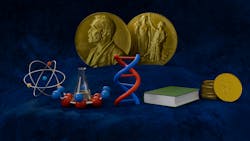2024 Nobel Prize in Chemistry: AI-Driven Protein Research
Baker and his research team later decided to use the software in reverse – that is, instead of entering amino acid sequences in the system, they input desired protein structures to obtain suggestions for its amino-acid structure.
Their work led to the field of protein design, the process of customizing proteins for desired attributes, such as the ability to break down hazardous substances or function as tools in chemical manufacturing. Baker and his research team eventually developed a way to build entirely new proteins from scratch.
“David’s success in harnessing the power of computational protein design to deepen our understanding of protein prediction and design has allowed for the creation of novel proteins to tackle some of the greatest challenges in medicine, technology, and sustainability,” said Timothy Dellit, CEO of UW Medicine and dean of the UW School of Medicine in a news release from the university. “His relentless pursuit of excellence and visionary approach to protein science has helped crack the code for understanding protein structure.”
The research group has continued to create proteins that show promise for pharmaceuticals, vaccines, nanomaterials and tiny sensors.
Demis Hassabis and John Jumper
Google DeepMind CEO Demis Hassabis and John Jumper, a senior research scientist at Google DeepMind, received the other half of the award for their work on an AI model called AlphaFold2.
They used the AI model to predict the structure of nearly all 200 million proteins that researchers have identified.
More than 2 million people from 190 countries have used AlphaFold2 for various scientific applications. With the technology, researchers can better understand antibiotic resistance and create images of enzymes that can decompose plastic.
Hassabis called the award “the honor of a lifetime.”
“I’ve dedicated my career to advancing AI because of its unparalleled potential to improve the lives of billions of people. AlphaFold has already been used by more than two million researchers to advance critical work, from enzyme design to drug discovery,” he said in a news release. “I hope we'll look back on AlphaFold as the first proof point of AI's incredible potential to accelerate scientific discovery."
Jumper noted that AI will make science faster and help in the development of therapeutics.
“Computational biology has long held tremendous promise for creating practical insights that could be put to use in real-world experiments,” he said.

